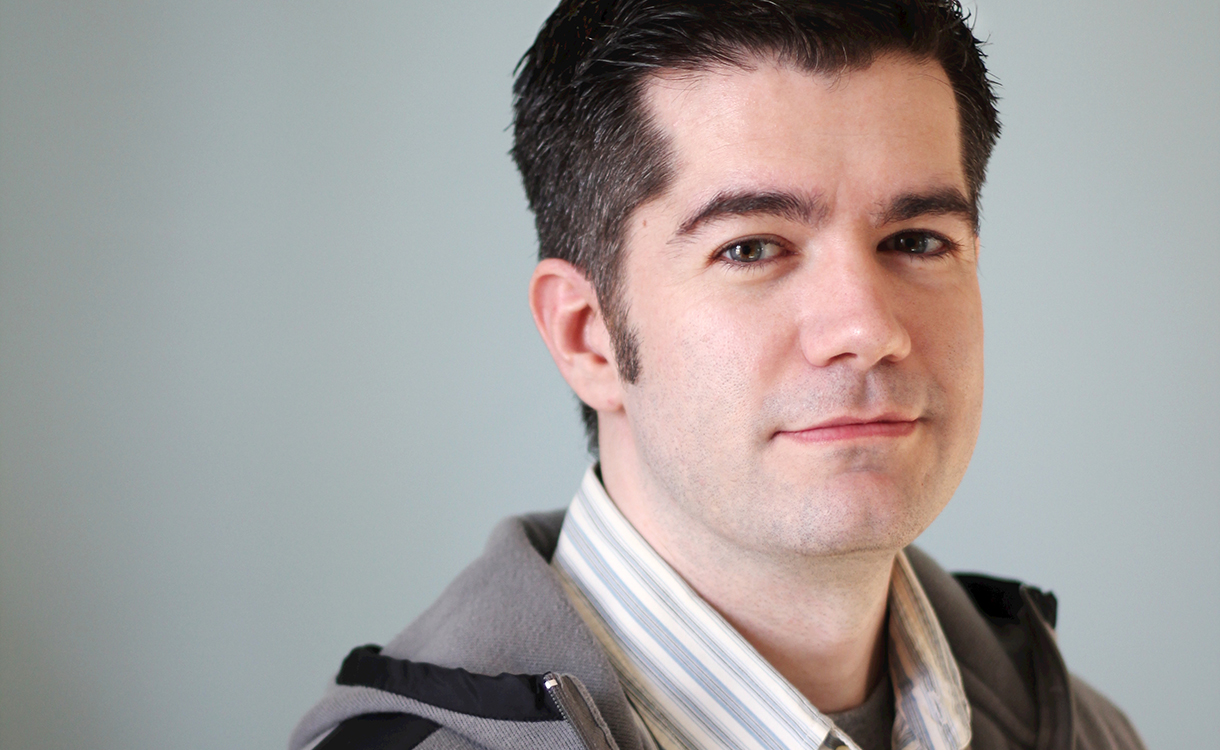On the Red Couch with Science of Happiness Writer Eric Barker
Mia Quagliarello / October 23, 2015

What’s the secret to a happy life? Vacation—as long as you’re accruing “experiences,” according to wellness and science of happiness writer Eric Barker. On his blog, Barking Up The Wrong Tree, this former philosophy student and screenwriter explores humanity’s big questions (including “how to be awesome at life“) and then goes in search of the science to support his findings.
Speaking with some of the smartest people in the world, Barker receives an expert education in human behavior and the science of happiness. He pays it forward by dropping knowledge on his blog, which has been turned into a column for Time, a Flipboard partner. We spoke with Barker about what makes people happy, his three biggest life lessons and why we all need a vacation.
Talk about Barking Up The Wrong Tree, and how you got interested in this space and topic.
There’s this great quote from William Gibson, where he says the future is already here, it’s just not evenly distributed, and I think that’s a really good point. I think it’s interesting because we all have these things we hear from all different places—some are myths, some of them are true—and I want to know the real deal.
We live in this world with so much information; [and] those answers are there, like Gibson said. The future is here, we just don’t always have access to it.
I got to a point where I wanted to dig around; I wanted to talk to experts and look at the research. I wanted to get some answers for myself and to share them with others: how can we make our lives better? What do the experts have say? Are they ideas that we believe to be true? When are they true and how are they not?
Plenty of people cover this kind of stuff. What unique problems are you trying to solve with your approach?
Generally we are seeing a lot of one-off coverage of individual studies, and that can be useful if it’s good science.
But I don’t think we have a lot of people who are trying to dig deep and look at multiple sources. I don’t have a Ph.D. I’m not claiming to be an expert; I cover way too much stuff to be an expert on any one of them. But I think it’s good when we really spend the time so that we can get better answers.
Have you had any spiritual insights?
When I say “living a good life,” I don’t mean just making more money. I think what we see again and again is that happiness, and overall fulfillment, comes from relationships. It comes from connections to other people. That’s never a simple thing, but it’s something that we see again and again.
What are some of your most popular posts?
Happiness is something that people want to learn about. When I spoke to Shawn Achor, who did research at Harvard on the connection between happiness and success, [it] was incredibly popular. Shawn’s incredible insight that success doesn’t lead to happiness as much as happiness actually leads to success is really profound.
It’s one of those times where it’s something he can back up with science, but also something that we want to be true.
Another trend these days is a move toward acquiring experiences vs. things. Is this something you’ve written about? Is there a scientific basis?
Spending money to have experiences has a profound effect on people. We habituate to items we buy very quickly, and we kind of take them for granted, where experiences hang in our memory and shape who we are.
The other thing that’s key is to look at memories and sharing those with others. You might buy something, which would be nice for five minutes, before you put it in a drawer and never touch it again.
Whereas when you go on vacation, you’re probably doing it with somebody you care about. When you travel someplace—even an amusement park—you’re probably doing so with friends. When you’re building relationships and sharing experiences, it creates a common language with others and deepens bonds.
It’s tricky because we are all constrained for time and so it’s a lot easier to order stuff on Amazon than to go on vacation. But there’s research that [says] experiences are a better way to be happier than buying items.
You must have to read a tremendous amount of information. What are your essential reads, and what tools do you use to manage that?
I try and read more books and talk to more experts but I definitely read a lot of stuff online. We’ve got kind of this renaissance of just amazing content out there, you know?
The Atlantic, The New Yorker, Vox, FiveThirtyEight—there are a lot of sites that are doing powerhouse stuff. I pull from many sources. I think Flipboard is a fantastic tool that I can have on my iPad to roll together so many different things because I am always pulling from a lot of different places.
Sometimes I’m looking for articles; other times I’m looking for reading recommendations or experts I want to talk to, and anything that provides that filter for me. What ’m trying to do in many ways is provide curation—a filter—for people.
Most people don’t want to read scientific studies. They don’t have time to read that many books or talk to a lot of experts. I try and do that for them. Tools like Flipboard provide the filter to transform a torrent of information into a digestible stream.
What books do you think everyone should read, and/or what book is on your bedside table right now?
Wow, there are so many. Some that made such a difference to me are:
–Adam Grant’s Give and Take, which addresses the issue of nice guys and ethics with some fantastic research.
–Dan Pink’s Drive, which really explains the key to motivation.
David Epstein’s The Sports Gene. I’m not a big sports guy; it’s just a great analysis of nature and nurture, seen through the lens of sports.
–George Vaillant’s Triumphs of Experience, which follows a longitudinal study about about what makes great lives. The study started on Harvard undergrads ate in the 1930s or 1940s, following them throughout their lives.
So what have you learned? What are your three biggest takeaways from your column?
After approaching this stuff from an attempted rational perspective, ironically it’s led me to appreciate emotions more. We see writing about “how to be smarter” and “how to be more rational,” and hey, those are great things—but I think what we all want is happiness.
We want relationships, we want to be motivated, we want to be passionate. All of those things aren’t about thinking; they’re about feeling. We need to get to the answer of feelings and emotion. We have a tendency to want to ignore feelings or to blindly follow them. The answer is somewhere in-between.
~MiaQ is curating Betterment
GET FLIPBOARD ON:
iOS / ANDROID / WINDOWS / WEB
FOLLOW US ON:
FLIPBOARD / TWITTER / INSTAGRAM / FACEBOOK / GOOGLE+ / TUMBLR /YOUTUBE / SOUNDCLOUD / PINTEREST / MEDIUM




